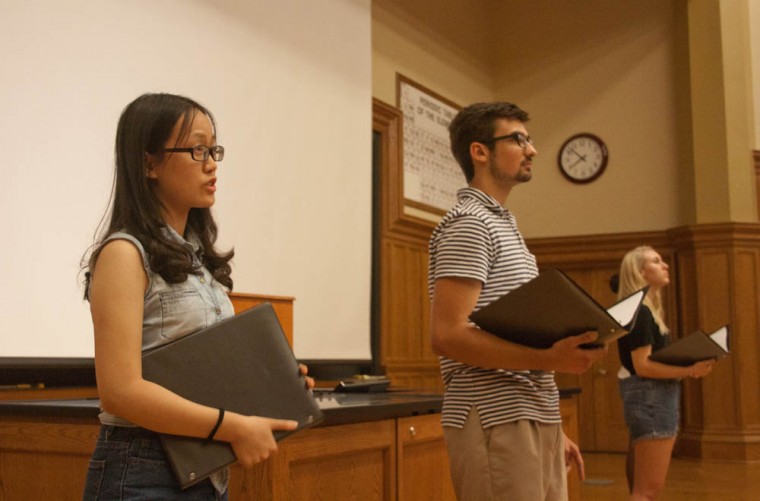News
‘Our Names, Our Stories’ sparks new dialogues on campus diversity

Student actors perform in front of a crowd of freshmen, resident advisors and Washington University Student Associates in LabSci 300 on Saturday, Aug. 23. “Our Names, Our Stories” was a new addition to this year’s Bear Beginning programming, and four monologues from the actors focused on different areas of diversity amongst the new freshman class.
Freshman orientation saw the addition of a new production intended to educate students on issues of diversity and inclusion, the latest in a series of such initiatives on campus.
The first production of “Our Names, Our Stories” came on the heels of the opening of Washington University’s Center for Diversity and Inclusion. The program featured two videos about engagement in campus groups, a skit and a round of “Stand up, Sit down,” during which audience members stood when they identified with a statement read by the skit’s actors.
Named after the late Dean James McLeod’s popular refrain to know each student by name and story, the production facilitated discussion among freshman floors about issues not addressed by longstanding programs “Choices” and “The Date.”
Rob Wild, dean of the First Year Center and associate vice chancellor for students, said that the program’s creation was a combination of long-term planning and the campus conversations surrounding diversity after the racial incident in Bear’s Den in February 2013, when a student in Bear’s Den recited a rap song that contained a racial slur for a fraternity pledge event.
“‘Choices’ had included some of [diversity and inclusion] content in the past; we thought we could do a better job by pulling it out as its own program,” Wild said, adding that the University had already started investigating what other institutions were doing for such programming.
“The Bear’s Den incident certainly is not the reason we decided to do it, but it was a contributing factor,” he added.
The centerpiece of the 45-minute presentation was a skit featuring four student actors reading testimonials written by University students and submitted to the FYC last spring. The four parts included a student identifying as gay who was afraid to tell his friends; a black student struggling to adjust to being “surrounded by white people”; a student from rural Tennessee unfamiliar with having ethnically diverse classmates; and an Asian-American student whose professor asked her, “What are you?”
Wild emphasized that the scripts were written so as to portray a variety of discriminatory experiences.
“All too often, when you see conversation around diversity…you see people focus specifically on race, and our strategy really was to think about the many layers of identity and diversity—so not just race but also sexual orientation, socioeconomic diversity, gender diversity,” he said.
Audience members indicated that the Asian-American student’s story was the highlight of the performance. Resident advisor and senior Jason Silberman said, “I think it was kind of shocking for [my residents] because they view professors as people who know everything and are always respectful and knowledgeable…the fact that it was all true I think made them realize that it’s not just something that we’re trying to teach you, it’s actually something you’re going to be experiencing at some point.”
Many students felt that the program led to meaningful discussions when they talked about it afterward.
“Everyone on my floor really enjoyed the program, and in the discussion afterward, everyone was involved and talking,” Silberman said.”
“Our floor had a pretty good discussion,” freshman Larisa Bokota said. “A lot of people talked and a lot of people had opinions because our floor has a variety of different kinds of people on it, [so] everybody could really relate to the show.”
Wild said that the heavy involvement of students in producing the skits contributed to its success.
“I think that really makes the productions a lot more real, when they’re created and acted by people who are not too far removed from the students sitting in the audience,” Wild said.
Some freshmen thought that the performances were imbalanced, however.
Freshman Olivia Beres enjoyed the Asian-American student’s story, but was disappointed with the story of the student from Tennessee. “I thought it incorrectly described most people; I thought it tried to speak for all people in rural communities and from the south, and I didn’t necessarily think it did that delicately, particularly in the voice that the actor chose to use. I thought it was a little bit mocking of particularly southern women,” Beres said.
Other audience members said they thought “Our Names, Our Stories” was an addition better than some already-existing programming during Bear Beginnings.
“I think sometimes that ‘Choices’ can come off as a little bit preachy in a way that is kind of fake and just crafted so that they can get the point across,” Silberman said, “whereas ‘Our Names, Our Stories’ is a very natural and organic way of introducing topics of diversity and inclusion.”
Editor’s note: John Schmidt, the writer of “Our Names, Our Stories,” is a managing editor for Student Life. He was not involved in the writing of this story.
